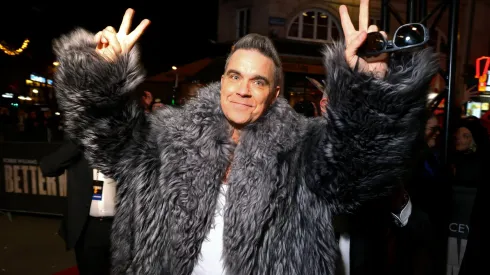Robbie Williams’ ascent didn’t unfold in a straight line; it moved with the volatility of someone built for spectacle, reinvention, and the occasional sharp turn.
After stepping out from his boy-band beginnings in the mid-’90s, he forged a solo identity powered by swagger and a gift for melodies that cut through the noise of British pop’s busiest era.
As the hits accumulated, he refined a catalogue that blended theatrical flair with a disarming sensitivity, producing anthems capable of filling stadiums while still carrying something distinctly personal.
Angels (1997)
This is arguably the defining song of Williams’ entire career. Released during a tumultuous early solo period, “Angels” was the sincere, emotionally resonant ballad that transformed him from a troubled ex-boyband member into a credible, serious artist. Its massive commercial success across Europe and its adoption as a staple for stadium singalongs cemented its status as a timeless, global anthem that transcended pop.
Millennium (1998)
Serving as the crucial lead single from his second album, I’ve Been Expecting You, “Millennium” signaled his arrival as a true superstar. With its infectious, sampled hook from John Barry’s theme for You Only Live Twice, the track brilliantly blended his cheeky pop sensibility with a cinematic, sophisticated edge, achieving his first UK number one and proving his breakout success was no fluke.
She’s the One (1999)
A masterful piece of orchestral pop, “She’s the One” was a cover that Williams made entirely his own. It showcased his surprising vocal command over a lush, sweeping arrangement. Winning the BRIT Award for British Single of the Year, it demonstrated his versatility and ability to tackle mature, romantic material without losing his pop edge, achieving enormous airplay success.
Rock DJ (2000)
A perfect example of Williams’ confrontational, swaggering showmanship, “Rock DJ” was a massive, funky dance-pop hit. Its instantly catchy chorus and provocative, controversial music video—which featured Williams literally shedding his skin—captured global attention. It underscored his ability to dominate cultural conversations and deliver high-energy, unforgettable pop singles.
Feel (2002)
Taken from the blockbuster album Escapology, “Feel” is a powerful, introspective track that marked a turn toward a more reflective, rock-influenced sound. It became a huge transatlantic hit, showcasing a deeper, more vulnerable side of Williams’ songwriting and vocal performance, proving he could write global anthems outside of the high-energy pop sphere.
Supreme (2000)
This sophisticated, string-laden track perfectly illustrates Williams’ flair for old-school showmanship blended with modern production. Not only did the song achieve major success across Europe, but its unique incorporation of the theme from Gloria Gaynor’s “I Will Survive” showcased his talent for musical interpolation and dramatic pop arrangement.
Let Me Entertain You (1997)
More than a hit single, “Let Me Entertain You” became Williams’ rallying cry and concert opener. It was the moment he declared his solo independence with theatrical, aggressive rock energy. The track perfectly encapsulates his chaotic charm, his dedication to showmanship, and his mission to command a stage, instantly defining his early post-Take That era.
Kids (with Kylie Minogue) (2000)
A fantastic collaboration with fellow pop icon Kylie Minogue, “Kids” was a high-octane dance track that successfully merged their two distinct personas. It demonstrated Williams’ savvy for strategic collaborations and his ability to create chemistry in the studio, resulting in an enduring, genre-blending UK smash hit.
Come Undone (2003)
A darker, more urgent rock ballad from the Escapology era, “Come Undone” revealed the raw emotional turmoil often bubbling beneath his charming exterior. It was a significant hit that highlighted his willingness to explore difficult, personal themes, connecting with audiences on a more complex and human level than many of his upbeat anthems.
Heavy Entertainment Show (2016)
The title track from his 11th studio album represents his later-career confidence and self-awareness. It serves as a bombastic, theatrical celebration of his own legacy and his commitment to spectacle. This track demonstrated his continued relevance in the global pop landscape and his embrace of the Entertainer persona he had spent two decades cultivating.
